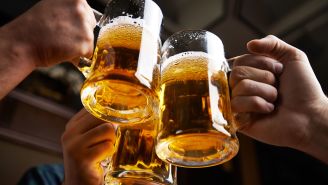If you read news online or watch TV—heck, if you have eyes and ears—you’ve likely heard that red wine is good for you. For years, it’s been claimed to protect against all kinds of cardiovascular problems, from heart attacks to stroke.
And it’s true, in a sense. Some research has shown that drinking alcohol in moderation is associated with certain health perks, though these findings are not definitive.
Meanwhile, the possible benefits of red wine, which are frequently overstated, may be offset by alcohol’s considerable drawbacks, according to Patricia Molina, MD, PhD, the head of the physiology department at Louisiana State University Health Services Center and director of the Alcohol and Drug Abuse Center of Excellence in New Orleans.
“I like red wine,” she says. “But I don’t think we have sufficient evidence to actually support a beneficial, or protective, effect.”
If you’re crazy for Cabernet, that doesn’t mean you have to ditch it forever. Before you pour your next glass, though, take the following into consideration.
The possible benefits of wine
First, the good news: Moderate alcohol intake, including red wine, is associated with some health benefits, mostly related to the heart.
Studies have found these include a small bump in HDL (“good”) cholesterol and a reduction in blood clots. Red wine may also help defend your arteries from LDL (“bad”) cholesterol, and safeguard the thin lining in your blood vessels, called the endothelium. Altogether, these might reduce the risk of cardiovascular disease.
How does it work?
Well, it’s not totally understood. Antioxidants found in wine, such as flavonoids and resveratrol, may be responsible. They help protect us from harmful molecules called free radicals, which damage cells and contribute to disease. Resveratrol, in particular, is often cited as a major benefit of red wine. Found in grape skin, some studies suggest it may help ward off heart problems, diabetes, neurological issues such as Alzheimer’s disease and stroke, as well as cancer.
The limitations of the claims
The problem is, while red wine’s health benefits sound great, the proof behind them isn’t clear-cut. For one thing, some research has shown that drinking beer, liquor or white wine may confer similar heart advantages. So, the compounds in your Merlot might not be particularly special.
But wait, there’s more: Many red wine studies use animals, meaning the effects may not translate for people. And the human studies? Most are observational, which means scientists simply report what they see in a given population. Subsequently, they can’t confirm vino directly affects heart health—just that moderate drinkers often seem to have fewer problems.
Another issue, says Molina, is that participants in red wine research may have had healthy lifestyles to begin with. For them, alcohol is a small part of a bigger beneficial pattern, rather than the key component to disease prevention.
“If the person drinking red wine also favors a Mediterranean-type diet, if that person also has an active lifestyle, if that person is not an obese individual,” she says, “all of those factors work together.”
It should be mentioned, too, that moderate drinking is linked to higher socioeconomic status. That means people who can afford the occasional glass of Shiraz may have better access to quality healthcare, for example, thereby reducing their risk of disease.
What about resveratrol?
This one comes with a few caveats, as well. Resveratrol content differs greatly between wines just as the alcohol content of wine varies from one type to the next. But while one wine may expose you to more alcohol than another, increasing your health risks, studies show that the amount of resveratrol in any given glass isn’t enough to provide health benefits. You’d have to drink bottles and bottles of wine to reap the potential advantages suggested by some studies.
“The damage to your liver—not to mention your GI tract—would be such that it would really obliterate any protective effects that you might get from resveratrol,” says Molina.
Those studies, by the way, rather than using red wine itself, often use high-dose resveratrol supplements. What’s more, few trials have actually involved humans, and most of those that do look at indirect measurements, such as inflammation, rather than real-world health outcomes. Some of the research that has looked at people has found no heart benefits to resveratrol at all.
And if there are pluses? You don’t necessarily have to drink red wine to get them. Resveratrol is also found in blueberries, cranberries, peanuts, pistachios and cocoa, as well as grapes and grape juice. Eating these may impart the same benefits (whatever they may be), without the drawbacks of alcohol.
Speaking about those drawbacks…
While people who imbibe red wine in moderation may see some health benefits, the potential problems likely outweigh them.
For one thing, many people who consider themselves light drinkers could actually consume more alcohol than they realize. In the United States, a single drink contains 0.6 fluid ounces of pure alcohol, which is the equivalent of 5 ounces of wine. If you’re dining out, however, overly generous pours in large glasses might be closer to 9 ounces of wine—nearly a double serving.
Moreover, most wines are about 12 percent alcohol, but certain varietals, including some Californian zinfandels and Australian Shiraz wines, are up to 18 percent. A 5-ounce glass of a wine that’s 18 percent alcohol is closer to 1.5 drinks.
Meanwhile, those who think alcohol will confer some health benefit might be tempted to overdo it, assuming that if one drink is good, two or even three would be even better. This isn’t the case.
Alcohol use increases your risk of many cancers, including breast, liver and mouth cancer. And the more you knock back, the higher your risk.
Drinking to excess also ups your odds for liver problems, gastrointestinal disorders and heart disease. "It can lead to heart failure,” says Molina. “It can increase your blood pressure. It can increase your chances of developing diabetes.”
Plus, the more people drink, the greater their odds of mental health issues, like depression and anxiety, and the more prone they are to violence, accidents and suicide.
The bottom line
Ultimately, experts recommend that no one should drink for the purpose of gaining health benefits. "It is more detrimental than beneficial in the long run,” says Molina.
That means if you abstain already, you have no reason to start. The health risks linked to drinking alcohol outweigh any possible benefits for all but the lowest levels of drinking.
If you do decide to imbibe on occasion, be mindful about your portions and don’t overdo it. Avoid binge drinking and limit your intake to one drink daily for women, two for men. The Sharecare app (available for iOS and Android) can help you track your alcohol intake.
A standard alcoholic drink is considered:
- 1.5 ounces of 80-proof spirits or 1 ounce of 100-proof spirits
- 5 ounces of wine
- 8 ounces of malt liquor
- 12 ounces of beer
There are exceptions, of course, like if you’re pregnant or have certain medical conditions. Speak to your healthcare provider (HCP) about what’s best for your situation. Your HCP can also suggest other, tried-and-true health boosters like eating a healthy diet, quitting smoking and getting sufficient exercise.
In the end, Molina says, alcohol can be a part of your life if you approach it the right way: “Drinking alcohol can be an enjoyable pleasure that, if your health permits, should be enjoyed responsibly and moderately.”






